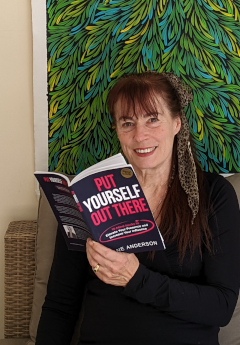|
|
|
|
|
|
|
|
|
Dear reader,
Welcome to The Director's Dilemma July 2022
Each month this newsletter looks at a real-life scenario that happened to a board, perhaps to a board like yours, and considers a range of responses. The scenarios are de-identified to protect the individuals concerned. This month we look at how to handle overbearing and callous behaviour of some board members towards the rest of the board and the executive team.
I work with boards and directors as a confidential mentor to help them build great companies and maximise their impact, and if you would like coaching from an experienced board mentor, please call me.
To read this email in a web browser, go to www.mclellan.com.au/newsletter.html and click on 'read the latest issue'. I hope you will enjoy the latest dilemma:
 Tyson is a Board Chair who has a problem on his Government-owned Board. His four word description of the problem was: 'We are being bullied.' Tyson is a Board Chair who has a problem on his Government-owned Board. His four word description of the problem was: 'We are being bullied.'
His Board has a total of 15 Members. At the start of every meeting, three Board members can be counted on to complain about veracity of the minutes, the advisability or validity of previously made Board decisions, and the need to make extensive changes to the official record.
Tyson feels unable to contain the situation, and the arguments often end up taking between one and two hours at each meeting. Tyson says "The most frustrating thing is that none of the items that this trio raises are ever on our agenda. This means that progress on our scheduled items is stalled, that critical items get dealt when most members are tired and impatient, and that therefore the risk of making flawed decisions without enough discussion becomes exceedingly high."
The CEO tries to keep other staff away from the board, so they don't witness this behaviour. The board is starting to lose touch with the organisation. The Minister is unaware of the issue and believes that the board is diverse and therefore well-functioning.
It feels to him like twelve directors are being bullied by three very organised and assertive directors.
What can he do to fix this?
|
|
|
|
Eli's Answer
 I am troubled by the math: How is it that three members are able to impose their will on twelve colleagues, and, in effect, dictate how meeting time would be spent? From a voting perspective, the standard principle that applies is: The majority rules, although the minority should be heard before votes are taken. In this case, the decision to spend substantial amounts of precious time on unscheduled items amounted to minority rule. This, in essence, is a form of bullying. So, how can procedural disputes, like disagreements on whether an unscheduled item would have precedence over scheduled ones, be resolved? I am troubled by the math: How is it that three members are able to impose their will on twelve colleagues, and, in effect, dictate how meeting time would be spent? From a voting perspective, the standard principle that applies is: The majority rules, although the minority should be heard before votes are taken. In this case, the decision to spend substantial amounts of precious time on unscheduled items amounted to minority rule. This, in essence, is a form of bullying. So, how can procedural disputes, like disagreements on whether an unscheduled item would have precedence over scheduled ones, be resolved?
What you need is a sensible way to allow the minority to be heard, while enabling the majority to ultimately decide how to proceed. Here is a script you can use in the future:
"Members A, B and C, you seem to want to discuss items Y and Z, which do not appear on the agenda, and you want to do that ahead of all scheduled items. The decision on whether to change the agenda and accommodate your request will be made by the Board. The Board has a policy that agenda items must be submitted at least __ days before a Board meeting. If this policy is to be suspended, I will need a vote. So here is the process: I will give you up to two minutes to explain why the agenda should be changed to accommodate your request. After your explanation I will allow up to two minutes for other members to discuss whether your item should be added and, if so, where to place it on the agenda."
The conclusion? It's important that you know how the board decision making process ought to work, and that you use this knowledge to address tough meeting scenarios. The fundamental premise should be: There are no bad people. There are only weak processes.
Eli Mina MSc PRP is a registered parliamentarian and an expert on meeting conduct. He is based in Queensland, Australia.
|
|
|
|
Julie's Answer

Approving minutes should not be an extensive discussion. Tyson needs to establish a proper process where comments on the minutes are received by the company secretary and incorporated (or rejected) within ten days of the meeting. The secretary and Tyson need to issue minutes within 48 hours for the directors to have a week to read and comment.
Comments should be about clarity, completeness and veracity, not about advisability.
At the meeting Tyson can use a 'consent agenda' where matters for noting and simple approval, including minutes which directors had the ability to comment upon prior to meeting, are agreed with no discussion. If anyone wants to discuss a consent item, they advise the chair before the meeting. Items removed from the consent agenda go to 'any other business' for the board to discuss if they wish to insert the item to their agenda and, if so, at what point.
Once the board has voted on how to treat the item, the meeting should move on with the official agenda. If any directors refuse to behave in an orderly fashion their behaviour can be minuted and the meeting adjourned if they do not meet norms of common courtesy.
Tyson should use an in-camera (or executive) session to discuss staff not attending the board meetings and the resulting lack of strong oversight. He should ask that all directors behave appropriately in future and read the minutes of the session into the board minutes, so they form part of the official record. He may also find it helpful to review his board charter and code of conduct.
This behaviour has likely escalated over time and Tyson should review the tenure of his directors and advise the Minister of which ones he would like to see renewed and why (or why not). The Minister has a right to know.
Julie Garland McLellan is an experienced non-executive director and board advisor based in Sydney, Australia. She travels the world providing director education and board development.
|
|
|
|
Julia's Answer
 Tyson needs to find out who his real troublemakers are. Are the three "difficult" board members being politically influenced. Do they act according to the plan of a higher politician? Obviously not the mentioned Minister as he/she is not aware of the problem. It could be another person or group of people who influence the "Three". Or are the three board members not aware of what their job is, what the Chair expects of them and which decisions need to be made efficiently? Tyson needs to find out who his real troublemakers are. Are the three "difficult" board members being politically influenced. Do they act according to the plan of a higher politician? Obviously not the mentioned Minister as he/she is not aware of the problem. It could be another person or group of people who influence the "Three". Or are the three board members not aware of what their job is, what the Chair expects of them and which decisions need to be made efficiently?
The mentioned Minister should be contacted. Tyson should speak with him/her openly, but confidentially, about the existing issue and suggest possible ways of solving it. He should also give the Minister the opportunity to contribute what he/she would do, what his/her expectations are and invite him/her to be a sparring partner. After all the Minister is the owner of the organization. Finally, Tyson should have one-to-one meetings with each of the three difficult board members, in order to find a common understanding of the future collaboration and work allocation, and make sure expectations, priorities etc. are understood.
The agenda of a board meeting can always be discussed, content can be added, priorities can be changed, but once the agenda has been agreed on before or at the start of the board meeting, the board should stick to the agenda and priorities. If the "Three" raise topics at the beginning of board meetings that were not on the agenda at all or have no high priority, the Chair should take notice of them, but discuss them either at the end of the board meeting or during an extra session (need for preparation etc.). Moreover, if the veracity of minutes is questioned, I recommend to record the board meetings in the future.
Julia Zdrahal-Urbanek is a Non Executive Director of Gebrueder Ulmer, and Founder and Managing Partner of AltoPartners Austria. She is based in Vienna.
|
|
|
|
Short practical videos
My recent video on how to read board papers was the most popular I have ever posted. You might like to visit and subscribe to my YouTube channel to see that and all the other videos. There are 55 short videos on a range of topics. Let me know of any topics you would like to see addressed and I will see if I can make a video for you.
Book Review - Putting Yourself Out There by Jane Anderson.
 Sometimes when I suggest that a prospective director network more actively within their target board community I get a vehement push back. I'm a board mentor, not a clever psychologist, so I never quite know how to effectively address the emotional response and instigate some effective action. Sometimes when I suggest that a prospective director network more actively within their target board community I get a vehement push back. I'm a board mentor, not a clever psychologist, so I never quite know how to effectively address the emotional response and instigate some effective action.
So, I was inordinately pleased when I got my hands on this very insightful book.
It includes some good diagnostic tools that help explain the nuts and bolts of putting your self out there authentically, without bragging, and without feeling like you have sold your soul. More importantly, it includes some short checklists and plenty of actions that you can take to build your path to confident presence and desirable influence.
The actions will help you to gain influence in your current boards as well as to navigate to boards that allow you to make a greater contribution to building your desired future.
Available for purchase on Jane Anderson's website.
Inspirational quote for July
This month my favourite quote is:

If you are dreaming of having a high performing board that makes a great impact, then you need to put in the work to build that dream in the day to day operations of your board and directors. Don't hesitate. It is worth the effort. And it is possible. You just need to make it happen.
If you don't know how to get started send me an email and I will give you some ideas.
Focus your director and board development
Boards often struggle to get cut through and drive company performance. They work hard, then they work harder, then call in a consultant who recommends some changes, then they work harder still.
If that sounds like your board, don't worry. It is likely that you have simply been focusing on the wrong stuff. I have made a diagnostic tool that might help you to prioritise the actions that will free your board from the drudgery and allow you to maximise your impact. You can take the diagnostic here:
https://directorsdilemma.scoreapp.com
Call me afterwards for a personalised action plan to revitalise and enhance the impact of your board work.
A note on names - A few readers have asked me where I find the names for the protagonists in each case study; I 'borrow' them from people I meet or things that I read. Tyson is a name that possibly derives from the old French word 'Tison' meaning Firebrand. It was a fitting name for the famous boxer who once said "Everyone has a strategy until they get punched in the mouth". Our protagonist Tyson needs to get on with his strategy and not let the flailing 'punches' of a few directors derail his carefully constructed agenda. Another potential meaning I like is a derivation of Dyson from the ancient Greek god of the harvest and wine. If our Tyson wants to relax with a glass and look back on this as an anecdote he successfully resolved, he will need to take decisive action.
This newsletter - If you have any ideas for improving the newsletter please let me know. If you are reading a forwarded copy, please visit my website and sign up for your own subscription.
Suggestions for dilemmas - Thank you to all the readers who have suggested dilemmas. They are greatly appreciated. I will answer them all eventually. I could not write this newsletter without your help and without the generous help of all the experts who respond each month to the case studies.
Be a contributor - if you would like to attempt a response to the dilemmas for publication you will be most welcome. Simply reply to this email and let me know. I am always on the look out for new talent from around the world so please reach out if that sounds like something you could do. I am also always grateful for the generous sharing of the current and past contributors. I couldn’t create such an engaging newsletter without their help.
Let's connect - I use LinkedIn to share information about boards and directorship with my friends and acquaintances. If you use LinkedIn and we are not yet connected I will welcome a connection from you. You can find me at linkedin.com/in/juliegarlandmclellan.
Let me help you - I would be delighted to speak for or train your board, staff, audience and/or group. If I can help, please contact me at julie@mclellan.com.au.
Farewell until the next issue due 1 August 2022. I look forward to greeting you again then.
Enjoy governing your companies!
Best regards,
Julie

Disclaimer:
The opinions expressed above are general in nature and are designed to help you to develop your judgement as a director. They are not a definitive legal ruling and do not constitute legal advice. Names and some circumstances in the case study have been changed to ensure anonymity. Contributors to this newsletter comment in the context of their own jurisdiction; readers should check their local laws and regulations as they may be very different.
Privacy: I am privileged to have your contact details and keep them as safely as possible. I will alert you if they are ever accessed by any unauthorised person (the technical staff at ayuda help with publishing and issuing the Director's Dilemma and have access so they can send the newsletters to you). I do not sell your details to anyone; they are kept only for the intended purpose - sending you this newsletter and helping to build the judgement of company directors by providing a safe way to consider potential responses to real life events.
|
|
|
|
|
|
|
 Tyson is a Board Chair who has a problem on his Government-owned Board. His four word description of the problem was: 'We are being bullied.'
Tyson is a Board Chair who has a problem on his Government-owned Board. His four word description of the problem was: 'We are being bullied.'
 I am troubled by the math: How is it that three members are able to impose their will on twelve colleagues, and, in effect, dictate how meeting time would be spent? From a voting perspective, the standard principle that applies is: The majority rules, although the minority should be heard before votes are taken. In this case, the decision to spend substantial amounts of precious time on unscheduled items amounted to minority rule. This, in essence, is a form of bullying. So, how can procedural disputes, like disagreements on whether an unscheduled item would have precedence over scheduled ones, be resolved?
I am troubled by the math: How is it that three members are able to impose their will on twelve colleagues, and, in effect, dictate how meeting time would be spent? From a voting perspective, the standard principle that applies is: The majority rules, although the minority should be heard before votes are taken. In this case, the decision to spend substantial amounts of precious time on unscheduled items amounted to minority rule. This, in essence, is a form of bullying. So, how can procedural disputes, like disagreements on whether an unscheduled item would have precedence over scheduled ones, be resolved?
 Tyson needs to find out who his real troublemakers are. Are the three "difficult" board members being politically influenced. Do they act according to the plan of a higher politician? Obviously not the mentioned Minister as he/she is not aware of the problem. It could be another person or group of people who influence the "Three". Or are the three board members not aware of what their job is, what the Chair expects of them and which decisions need to be made efficiently?
Tyson needs to find out who his real troublemakers are. Are the three "difficult" board members being politically influenced. Do they act according to the plan of a higher politician? Obviously not the mentioned Minister as he/she is not aware of the problem. It could be another person or group of people who influence the "Three". Or are the three board members not aware of what their job is, what the Chair expects of them and which decisions need to be made efficiently?

